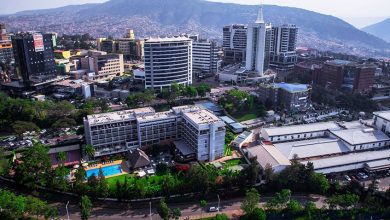The W.E.B. Du Bois Memorial Centre for Pan-African Culture: A Hub of History and Knowledge

Located in the heart of Accra, the W.E.B. Du Bois Memorial Centre for Pan-African Culture stands as a testament to the legacy of W.E.B. Du Bois, a renowned African-American Pan Africanist. This iconic institution not only houses the tomb and gravesite of Du Bois and his wife’s ashes but also serves as a repository of knowledge and a center for research on African development.
A Museum Celebrating Du Bois’ Life
The museum within the center showcases the life and accomplishments of Dr. Kwame Nkrumah’s esteemed ally, W.E.B. Du Bois. Visitors can explore the museum area, where they will find a collection of Du Bois’ belongings, which play a vital role in illustrating his life’s narrative. These artifacts offer a glimpse into the extraordinary journey of an intellectual and activist who left an indelible mark on history.
A Library Preserving Du Bois’ Scholarly Works
The library section of the center houses a treasure trove of books, manuscripts, letters, and articles authored by Dr. Du Bois during his lifetime. Scholars and academics interested in studying Du Bois’ key scholarly works can find them here. The library provides a valuable resource for those seeking a deeper understanding of Du Bois’ contributions to African-American history and the global struggle for equality.
The Entrance Plaque: A Tribute to Du Bois’ Poetry
As visitors enter the W.E.B. Du Bois Memorial Centre, they are greeted by an inscription from one of his most famous poems, “Children from the Moon.” This plaque serves as a poignant reminder of Du Bois’ literary prowess and his ability to capture the essence of the human experience through his words.
Du Bois’ Relationship with Ghana and Dr. Kwame Nkrumah
W.E.B. Du Bois was not only a prominent figure in the fight against racism and mistreatment of Africans in the United States but also had a deep connection with Ghana and its then-president, Dr. Kwame Nkrumah. In 1961, Nkrumah approached Du Bois to collaborate on the development of the Encyclopedia Africana, a groundbreaking encyclopedia focused on African history.
Du Bois, who held great admiration for Nkrumah, accepted the offer and relocated to Ghana, renouncing his US citizenship in the process. He became Nkrumah’s personal secretary and dedicated himself to the realization of their shared vision. Tragically, just two years after arriving in Ghana, Du Bois fell ill and passed away, leaving behind a profound legacy.
The Memorial Centre: Du Bois’ Final Home
Within the W.E.B Du Bois Memorial Centre, visitors can also explore the living quarters that Du Bois and his second wife, Shirley, once called home. This section of the center has been transformed into a museum, allowing visitors to gain insights into the personal life of this influential figure.
Du Bois’ Impact on Civil Rights
During the early decades of the twentieth century, as racial and gender discrimination persisted, initiatives to combat these injustices gained momentum. W.E.B. Du Bois emerged as a prominent advocate for civil rights and Pan-African unity among Africans and African descendants worldwide. While educator Booker T. Washington focused on economic development, Du Bois championed civil rights and fought against racial discrimination.
In 1909, Du Bois co-founded the National Association for the Advancement of Colored People (NAACP), which remains one of the most enduring civil rights organizations in the United States. Through the NAACP, Du Bois and his fellow activists exposed racial injustices and fought for equal treatment in various aspects of life, including education, employment, housing, and public accommodations.
Du Bois’ Influential Quotes
W.E.B. Du Bois’ eloquence and insight are captured in his powerful quotes, which continue to resonate today. He believed in the importance of unveiling the truths hidden beneath societal veils, advocating for pride in one’s race, and recognizing the value of education as a means of empowerment. Du Bois’ words serve as a reminder of the ongoing struggle for justice and equality.
Traveling to Ghana: COVID-19 Guidelines
For those planning a visit to Ghana, it is essential to be aware of the current travel restrictions. Ghana has reopened its borders to travelers from around the world. However, proof of COVID-19 vaccination or a negative test result is required for entry. It is also important to note that hotels, attractions, and private tours have implemented new health and safety protocols to ensure the well-being of visitors.
Plan Your Journey to Ghana
To make the most of your trip to Ghana, consult the ultimate travel guide to Ghana. This comprehensive resource provides valuable information and tips to help you plan an unforgettable experience while adhering to safety guidelines.
In conclusion, the W.E.B. Du Bois Memorial Centre for Pan-African Culture stands as a beacon of knowledge and a testament to the remarkable life and contributions of W.E.B. Du Bois. Through its museum, library, and research center, this institution ensures that Du Bois’ legacy lives on, inspiring generations to come in the pursuit of equality and justice.



